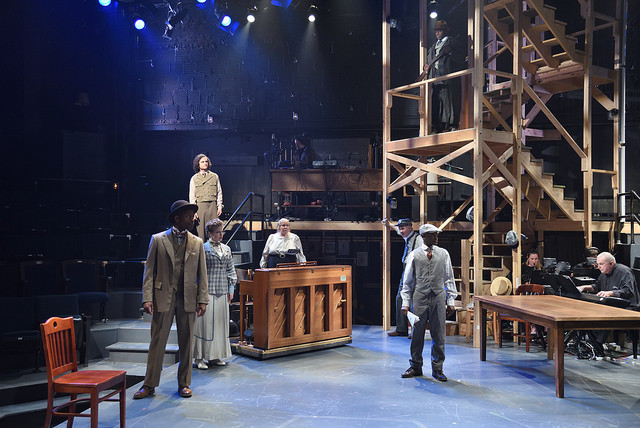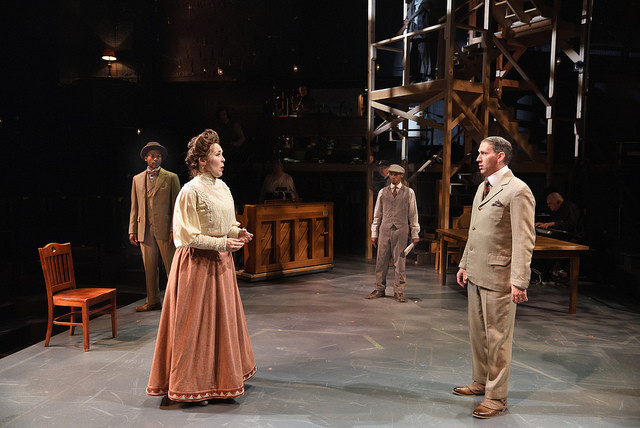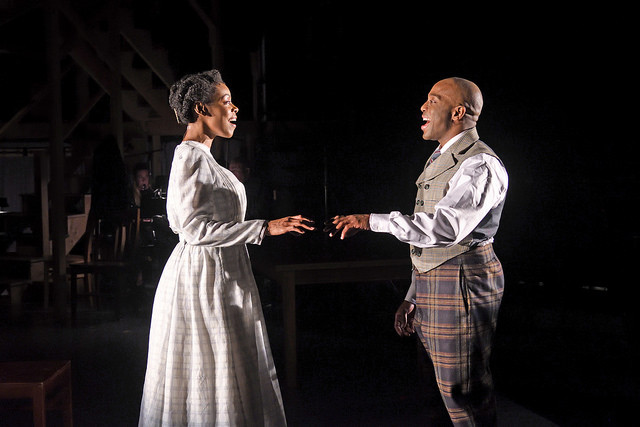Trinity’s ‘Ragtime’ still a powerfully relevant chronicle
In 1996, the famed Broadway trio of Terrence McNally, Stephen Flaherty and Lynn Ahrens joined forces to create the book, music and lyrics (respectively) for the musical “Ragtime.” Based on the 1975 fictional novel by E.L. Doctorow, “Ragtime” chronicles three families in New York City – an upper-class white family, an African-American couple and an Eastern European Jewish immigrant and his daughter. The families encounter episodic discrimination, hardship, despair and hope as their stories unfold and intersect.
“ ‘Ragtime’ is important to witness today because of its central themes,” said Curt Columbus, Trinity Rep’s artistic director and director of this production. “It is a tale of the most important and most dramatic struggles in the American experience: the struggles of women to be seen, of immigrants to find their place in a new land, of African Americans to get the full protection and process of the law, and of workers who suffer to line the pockets of the rich. In other words, the very same issues that we confront in America today.”
Trinity Rep not only chose this production because of its present-day relevance; they hoped it would be a call to action. To emphasize this, Trinity partnered with 30 other nonprofit organizations involved with notable causes. The lobby is set up with informational displays to encourage theater-goers to become involved in activism. In fact, by the time the audience breaks for intermission, patrons will surely be rallying for social justice and radical change.
If you are expecting a splashy Broadway production, think again. A cast of only 16 Trinity Rep actors bring early 20th century America to life. The stage is stark, and props are minimal. Musicians and the Foley artist (person responsible for sound effects) are visible. Costumes are contemporary but embellished with period accessories, thus reinforcing the musical’s modern-day relevancy.
“Although the musical takes place in 1906, one can't help escape the feeling that we are watching a glimpse of our society today,” said Rabbi Howard Voss-Altman of Temple Beth-El in Providence. “The musical's themes – racism, sexism, poverty and the impact of immigration on our national character – feel as relevant today as they must have felt more than a century ago." Temple Beth-El hosted a “Context & Conversation” event on May 10, which looked at the musical “Ragtime” through the lens of Trinity’s 2017-18 seasonal theme, “The American Dream, Then and Now.”
Even if you missed that conversation, you will not want to miss “Ragtime.” The musical opens up with a simple but haunting piano strain that will cling to you the entire show. Coined to describe the syncopated or “ragged” melodic line, ragtime was an early version of jazz characterized by jaunty rhythms. This style is evident in the toe-tapping tune “Gettin’ Ready Rag” performed by by Wilkie Ferguson III. Ferguson, a classically trained pianist, portrays Coalhouse Walker Jr., an African-American pianist and one of the core characters of the musical. Ferguson has a soft but strong voice, and his charm is intoxicating. He is aptly cast and complements Mia Ellis, who plays Coalhouse’s love interest, Sarah. What unfolds in their subplot will stir something within you, as it is meant to do.
In addition to lively jazz tunes, throughout the musical you will also hear narrative ballads (“Your Daddy’s Son”), whimsical songs (“What a Game!”) and folksy Jewish melodies (“A Shtetl Iz Amereke”).
Speaking of Jewish, one of the main characters is a Jewish immigrant named Tateh (whose name in Yiddish means “daddy” or “papa”). He tries to make a living selling silhouette cut-outs on the street corner while caring for his young daughter. Tateh, portrayed by Charlie Thurston, is the quintessential immigrant who struggles for stability and meaning.
One character, known only as Father and played by Mauro Hantman, is a wealthy white man headed on an expedition to the North Pole. However, he is as cold and distant as his would-be destination. The other two paternal characters – Coalhouse and Tateh – have more social graces and kindness than the affluent and wealthy Father.
Tateh and Coalhouse also represent forward-thinking, imagination and hope. Coalhouse purchases a Model T and believes that his son’s future will be filled with possibility and justice. (Spoiler alert!) By Act Two, Tateh has created a better life for his family and is accepted as American. Tateh’s entrepreneurial spirit propels him to reinvent himself as a director of silent films and is known now by a new name –Baron Ashkenazy. (I’m sure you recognize the play on words.)
The most captivating character, however, is Mother. Stunningly and sensually played by Rachael Warren, Mother develops into a broad-minded character who thinks for herself and follows her moral compass. She boldly cares for Sarah and Sarah’s baby boy when Mother finds the infant in the garden. In essence, Mother “hears new music.” Eventually Mother breaks away from her discontented bourgeois existence by marrying Tateh. She is portrayed as a modern woman who creates a blended family, which includes her biological son, Tateh's daughter, and the child of Coalhouse and Sarah. This melting pot may sound mainstream today, but it would have been revolutionary in the early 1900s.
Warren’s performance is especially meaningful. Her energy is electric, and I had goose bumps when she sang “Back to Before.”
“I think there is so much to learn from the choices the imperfect, well-intentioned people in “Ragtime” make,” said Warren in an interview. “So much of ourselves to see in their story.”
You’ll also be delighted by the ensemble that intermittently play totemic, historical characters such as J.P. Morgan, Emma Goldman, Harry Houdini, Henry Ford, Booker T. Washington and Evelyn Nesbit. These real-life personalities who shaped America are woven into the drama and reiterate societal conflicts of the plot. It is made obvious that we still live in a world of the "haves" and "have nots."
I was especially impressed with Janice Duclos’ interpretation of the influential and well-known anarchist Emma Goldman, Stephen Thorne’s representation of illusionist Harry Houdini and Rebecca Gibel’s portrayal of the scandalous chorus girl Evelyn Nesbit.
Cast members are interspersed among the audience, which gives patrons the feeling that they, too, are part of the rallying crowd. It’s hard not to get wrapped up in a scene when character actor Fred Sullivan, Jr. (who alternately plays J.P. Morgan, a bigot known as Willie Conklin and other miscellaneous personalities) is standing next to your theater seat.
Notable performances also include lesser-known cast members Carla Martinez and Antonio Michael Woodward. Their powerful voices in “Till We Reach That Day,” which closes Act One, prompted patrons to stand up and be heard. During Intermission, curious audience members headed to the lobby to view the displays of local agencies. I witnessed many patrons take information, join mailing lists, sign up to volunteer and even register to vote.
When the show ended, I wanted to celebrate how far we’ve come, but when I turn on the evening news, it is obvious how far we still have to go. A striking portrayal of hardship and hope, "Ragtime" prompts me to sidestep the nostalgia and propels me into action. I recall a particular line from the musical: “I am here for what is right.” May we, like the characters in "Ragtime," be united by our hope and belief in a brighter tomorrow.
KARA MARZIALI is the Director of Communications for the Jewish Alliance and a theater aficionado.















